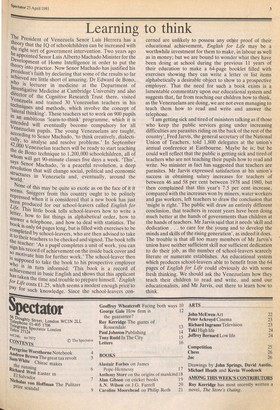Learning to think
The President of Venezuela Senor Luis Herrera has a theory that the IQ of schoolchildren can be increased with the right sort of government intervention. Two years ago he appointed Senor Luis Alberto Machado Minister for the Development of Home Intelligence in order to put the theory into practice. Now Senor Machado has justified his President's faith by declaring that some of the results so far achieved are little short of amazing. Dr Edward de Bono, who is lecturer in medicine at the Department of Inyestigative Medicine at Cambridge University and also director of the Cognitive Research Trust there, visited Venezuela and trained 30 Venezuelan teachers in his techniques and methods, which involve the concept of .lateral thinking'. These teachers set to work on 900 pupils In an ambitious 'learn-to-think' programme, which it is intended will eventually become compulsory for all Venezuelan pupils. The young Venezuelans are taught, according to Senor Machado, 'to think creatively, dialectically, to analyse and resolve problems.' In September 42,000 Venezuelan teachers will be ready to start teaching the de Bono technique to 1,200,000 schoolchildren, all of whom will get 90-minute classes five days a week. 'This', says Senor Machado, 'is a peaceful revolution, a deep revolution that will change social, political and economic structures in Venezuela and, eventually, around the None of this may be quite so exotic as on the face of it it seems, Sniggers from this country ought to be politely repressed when it is considered that a new book has just ben Produced for our school-leavers called English for ;di.,e. This little book tells school-leavers how to write a letter, answer , how to list things in alphabetical order, how to a telephone, and how to deal with statistics. The book Is only 64 pages long, but is filled with exercises to be c. °Inpleted by school-leavers, who are then advised to take Itto their teachers to be checked and signed. The book tells the teacher: 'As a pupil completes a unit of work, you can sn IP his record of achievement on the inside back cover and So motivate him for further work.' The school-leaver then 'S Supposedto take the book to his prospective employer who Is in turn informed: 'This book is a record of achievement in basic English and shows that this applicant has taken the time and trouble to prepare himself.' English for Lice J Costs £1.25, which seems a modest enough price' to Pay for such knowledge. Since the school-leavers con cerned are unlikely to possess any otlyer proof of their educational achievement, English for Life may be a worthwhile investment for them to make, in labour as well as in money; but we are bound to wonder what they have been doing at school during the previous 11 years of their education to make a 64-page booklet filled with exercises showing they can write a letter or list items alphabetically a desirable object to show to a prospective employer. That the need for such a book exists is a lamentable commentary upon our educational system and suggests that, far from teaching our children how to think, as the Venezuelans are doing, we are not even managing to teach them how to read and write and answer the telephone. 'I am getting sick and tired of ministers talking as if those who keep the public services going under increasing difficulties are parasites riding on the back of the rest of the country', Fred Jarvis, the general secretary of the National Union of Teachers, told 1,800 delegates at the union's annual conference at Eastbourne. Maybe he is; but he could well reflect that the public is getting sick and tired of teachers who are not teaching their pupils how to read and write. No minister in fact has suggested that teachers are parasites. Mr Jarvis expressed satisfaction at his union's success in obtaining salary increases for teachers of between 46 and 58 per cent between 1978 and 1980, but then complained that this year's 7.5 per cent increase, compared with the increases won by miners, water workers and gas workers, left teachers to draw the conclusion that 'might is right.' The public will draw an entirely different conclusion, that teachers in recent years have been doing much better at the hands of governments than children at the hands of teachers. Mr Jarvis said that it needs 'skill and dedication . . . to care for the young and to develop the minds and skills of the rising generation', as indeed it does. The trouble is that all too many members of Mr Jarvis's union have neither sufficient skill nor sufficient dedication to do their job, as the number of school-leavers scarcely literate or numerate establishes. An educational system which produces school-leavers able to benefit from the 64 pages of English for Life could obviously do with some fresh thinking. We should ask the Venezuelans how they teach their children to read and write, and send our educationalists, and Mr Jarvis, out there to learn how to think.


































 Previous page
Previous page